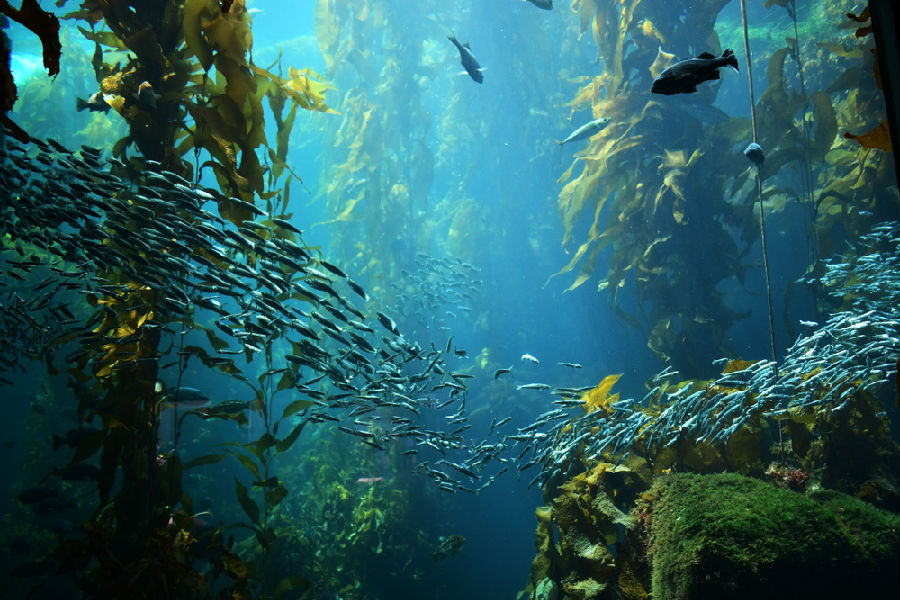Turn the Tide
力挽狂瀾
By Aran Baker
文/阿蘭·貝克
For Mick Baron, the giant kelp forests of Tasmania were a playground, a school and a church.
對米克·巴倫來說,塔斯馬尼亞的巨型海藻森林是一座游樂場、也是一所學校,一座教堂。
The former marine biologist runs a scuba-diving center on the Australian island's east coast,
這位前海洋生物學家在這個澳大利亞島嶼的東海岸經營著一家潛水中心,
and rhapsodizes about the wonders of the seaweed's dense habitats.
興奮地訴說了這個充滿海藻的地方的奇妙之處。
"Diving in kelp is one of the most amazing underwater experiences you can have,"
“在海藻里潛水是世界上最贊的水下體驗之一,”
the 65-year-old says, likening it to flying through the canopy of a terrestrial rain forest.
這位65歲的老人說,稱其好比從陸地上熱帶雨林的樹冠上飛過一般。
"You won't find a single empty patch in a kelp forest ...
“到了海藻林里,你就連一塊空地找不出來……
From the sponge gardens on the seafloor all the way up to the leaves on the surface, it's packed with life."
從海底海綿一般的花園一直到水面上的各種葉子,中間活躍著各種生物。”
Or rather, it was.
更確切地說是,曾經活躍著各種生物。
In late 2015, a marine heat wave hit eastern Australia,
2015年末,一股海洋熱浪襲擊了澳大利亞東部,
wiping out a third of the Great Barrier Reef, and the kelp forests Baron had been exploring for most of his life.
足足摧毀了三分之一個大堡礁,還有巴倫探索了大半生的海藻林。
"We were diving in a nice thick forest in December," says Baron.
“12月份我們還在一片茂密的(海藻)森林里潛水,”巴倫說。
"By end of March, it looked like an asphalt driveway."
到了3月底,那里就已經像個瀝青車道似的了。”

Recurring heat waves have prevented kelp and coral from recovering;
反復出現的熱浪妨礙了海藻和珊瑚的恢復;
marine temperatures on Australia's east coast are on average 2°C higher than a century ago,
澳大利亞東海岸的平均海洋溫度已經比一個世紀前高出了2°C,
an increase scientists attribute to rising greenhouse-gas emissions.
科學家們將上升原因歸結到了溫室氣體排放增加這一問題之上。
"The ocean is deceptively fragile," says Baron.
“海洋并沒有看上去那么頑強,”巴倫說。
"Two degrees doesn't sound like much,
“兩度聽起來不算多,
but not many species can handle that kind of temperature change."
但能適應這一溫度變化的生物并不多。”
Baron, a gregarious, bearded and perennially sunburned Australian,
巴倫,一個愛交際,留著胡子,常年曬得黝黑的澳大利亞人,
introduced generations of divers to Tasmania's kelp cathedrals.
將塔斯馬尼亞的海藻教堂推薦給了一代又一代的潛水愛好者。
His own grandchildren, he says, will have to learn about them from his YouTube videos.
但他自己的孫兒孫女,他說,卻只能從他的YouTube視頻中了解這一海藻教堂了。
Nearly 95% of eastern Tasmania's kelp forests are gone, a preview of what is to come for the ocean as a whole.
塔斯馬尼亞東部近95%的海藻森林都已經消失,整個海洋的命運可見一斑。
"Tasmania's kelp forests are the poster child for what climate change means for our oceans," he says.
“氣候變化對我們海洋意味著什么,塔斯馬尼亞的海藻森林就是典范,”他說。
"What is happening here is what will happen everywhere else in a decade or two."
“這里正在發生的事情就是其他地方一二十年后會發生的事情。”
譯文由可可原創,僅供學習交流使用,未經許可請勿轉載。











